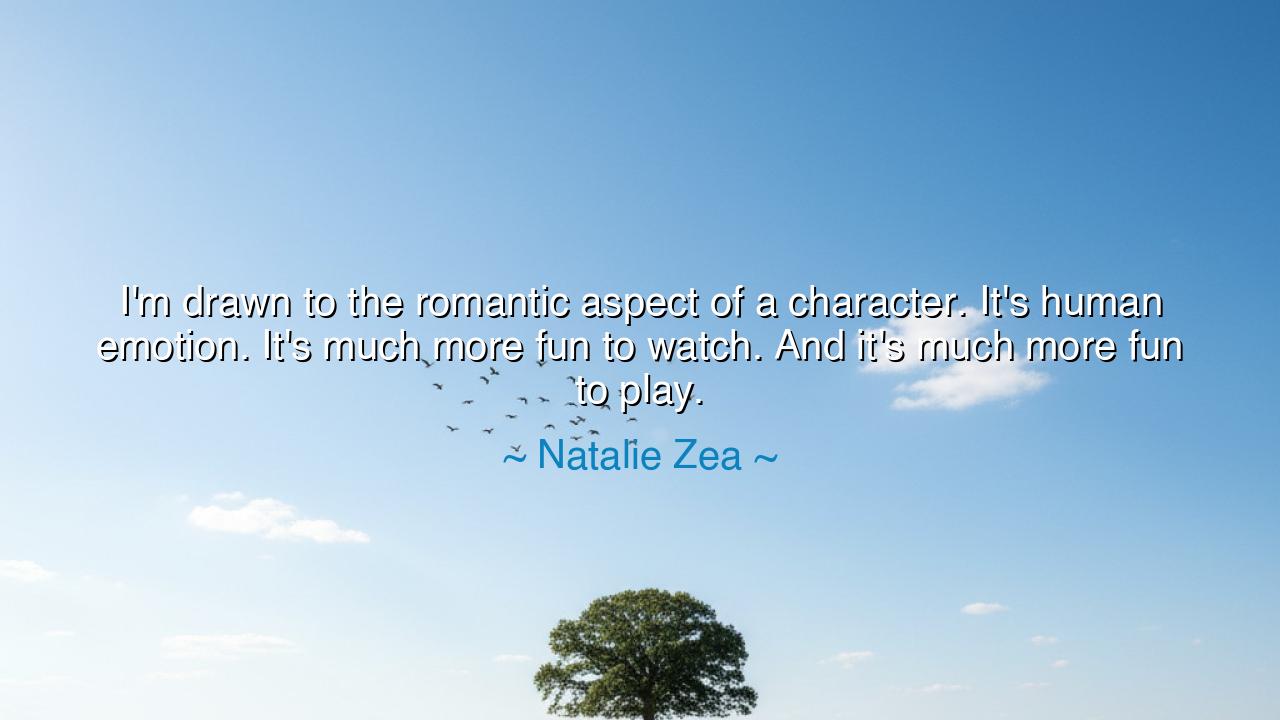
I'm drawn to the romantic aspect of a character. It's human
I'm drawn to the romantic aspect of a character. It's human emotion. It's much more fun to watch. And it's much more fun to play.






"I'm drawn to the romantic aspect of a character. It's human emotion. It's much more fun to watch. And it's much more fun to play," says Natalie Zea, and in these words lies a profound recognition of the power of romance to reveal the depths of the human heart. The romantic aspect of a character is not just about love in the superficial sense; it is about exploring the raw and vulnerable aspects of being human. Romance taps into the core of human emotion, a force that shapes our decisions, our fears, and our desires. To play a romantic character is to embrace the full spectrum of human experience—the joy, the pain, the longing, and the connection that come with love. It is the most compelling aspect of the human spirit, and Zea’s words reveal why it is so magnetic to both actors and audiences alike.
The ancient Greeks, with their deep understanding of human nature, spoke often of Eros, the god of love, who was both a force of creation and destruction. Love was seen as a divine force, one that could drive people to the heights of joy or the depths of despair. Romantic love in particular was considered the most powerful of emotions because it transcended the individual, uniting two souls in a way that could transform both. The concept of romance was thus not merely about the union of two people; it was about the way that love shaped the world, created beauty, and even brought about the destruction of those who could not control it. Zea's admiration for this aspect of acting taps into this ancient understanding—romantic roles are not just about superficial attraction, but about expressing the full emotional truth of what it means to be in love.
Throughout history, romantic narratives have served as vehicles for emotional expression, allowing us to witness the vulnerability and power that love brings. In literature, Romeo and Juliet stands as one of the most iconic tales of romantic love—a story not just about young lovers, but about the intensity of emotion, the risks involved in loving deeply, and the consequences of love gone wrong. Their love is tragic, yes, but it also reveals the complexity of human emotions. It is fun to watch, as Zea describes, because it taps into something universal—our shared experience of wanting, hoping, and sometimes losing. Shakespeare knew this deeply; he understood that the emotional stakes of romance are higher than any other type of human connection. Thus, the power of romantic roles in theatre and film is in their ability to communicate this emotional depth—something that connects all of us, no matter who we are.
Consider also the story of Abelard and Heloise, whose passionate love affair not only defied societal conventions but also led them down paths of great personal sacrifice and heartache. Their letters, filled with longing, are still studied today for their raw expression of love, pain, and intellectual depth. Their romance was not merely about the pleasures of love, but about the intensity of connection—the willingness to give oneself fully to another despite the consequences. Such stories show us that romance, when portrayed authentically, speaks to the human condition in profound ways, touching upon themes of vulnerability, choice, and loss.
Zea’s enjoyment of playing romantic characters also speaks to the joy that comes from embracing the complexities of human emotions. In acting, as in life, it is often the exploration of conflict and growth that makes the experience of love compelling. To play a romantic character is not simply to enact moments of affection; it is to bring to life the struggles and revelations that accompany the human experience of falling in love. This emotional resonance is what makes romantic stories so powerful to witness and participate in. There is a vulnerability in loving deeply, in caring for someone beyond oneself, and this vulnerability is what makes romantic roles so dynamic and rewarding to portray.
The lesson to be drawn from Zea’s words is clear: to understand romance in its full depth is to understand what it means to be human. Love, in all its forms, shapes our lives, drives us toward greatness, and sometimes leads us to tragedy. To play a romantic role is to embrace the truth of these emotions and to express the joy and pain that come with them. In our own lives, we should seek to embrace the full spectrum of emotion that love brings. Love is not simply the moments of affection but the growth, the sacrifice, and the learning that come with it. Romance teaches us to be vulnerable, to step beyond ourselves, and to see the world through the eyes of another.
As we navigate our own relationships, let us remember the emotional complexity of love. Let us seek to understand romantic love not just in moments of joy, but in the challenges it presents. Like the actors who play these characters, we too must embrace the full depth of what love offers: the joy, the struggle, and the revelation that comes when two souls connect deeply. It is in this willingness to feel deeply that we find the truest essence of romance—and the truest connection with others.






AAdministratorAdministrator
Welcome, honored guests. Please leave a comment, we will respond soon